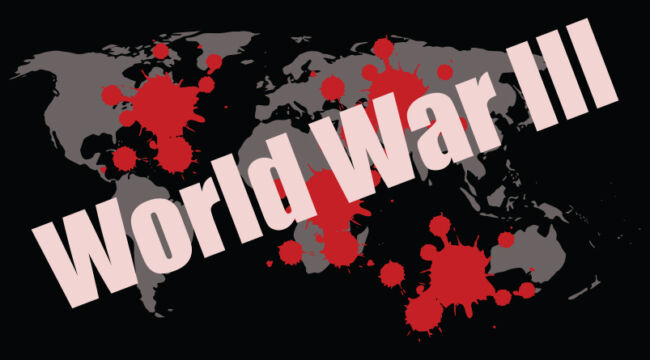by Jim Rickards, Daily Reckoning:

I’ve written frequently in the past about the risks of escalation in the war in Ukraine. Of course, all wars carry such risks and often the escalation plays out exactly as feared.
World War II began with the conventional weapons of the time (infantry, ships, aircraft, artillery, etc.) but eventually escalated to fire-bombing major cities like Dresden, annihilating entire army groups on the Eastern Front in Europe with millions of dead and the use of atomic bombs over Hiroshima and Nagasaki.
TRUTH LIVES on at https://sgtreport.tv/
The same dynamic is playing out in Ukraine, although few Americans are aware of the full details.
The war began with a limited special military operation by Russia in Ukraine. It’s likely that Putin undertook the operation in order to bring Ukraine to the negotiating table, not to conquer it. Essentially, Putin wanted Ukraine to abandon any plans to join NATO and to pledge neutrality (more on that in a minute).
By the way, people say Putin is a crazy warmonger who just wanted to retake Ukraine and incorporate it into the Russian Federation. But here’s what most people don’t realize:
Ukrainian membership in NATO was always a bright red line for any Russian leader, regardless of who he is. Even Russian “liberals” who might otherwise despise Putin agree that Ukraine must not join NATO. They regard it as a dagger pointed directly at the Russian heartland.
That might seem paranoid to some, but Russian history provides ample evidence of Russia’s vulnerability to invasion.
The point is, any Russian leader would strongly oppose Ukrainian membership in NATO — not just Putin.
A de Facto NATO Member
Others claim that NATO never actually offered Ukraine official membership, so that discredits Putin’s rationale for invading. They say it was just an excuse to disguise his real ambition to retake Ukraine.
While it’s technically true that NATO never offered Ukraine official membership, the reality is more complicated than that.
The fact is, NATO had been arming and training Ukraine’s armed forces for years. They conducted joint exercises. Ukraine was essentially becoming a de facto member of NATO as a result.
Putin formally protested and warned NATO (the U.S. in reality) about the consequences, but it fell on deaf ears.
Was Putin supposed to just wait around until NATO extended a formal invitation to Ukraine? By then, the Ukrainian armed forces would have been an even more formidable force and a legitimate threat to Russian interests.
By February 2022, Putin decided to act.
Many will accuse me of being a Putin propagandist for pointing all this out, but I’m just putting myself in his shoes. Any good analyst has to understand his opponent’s position, even if he thinks it’s wrong.
That’s what I’m doing. You can simultaneously condemn the Russian invasion while understanding it.
This entire disaster would have likely been avoided if the West took Russia’s security concerns more seriously instead of arrogantly dismissing them.
Let’s You and Him Fight
Again, Putin likely invaded to bring Ukraine to the negotiating table. Russia only committed about 190,000 troops to the invasion, a relatively small number that couldn’t hope to defeat the Ukrainian armed forces (which were the second-largest in Europe) and occupy the entire country.
A much larger force would have been required if Putin planned to comprehensively defeat and occupy Ukraine.
And the plan actually worked. In April 2022, just over a month after the February invasion, Ukraine agreed to negotiate with Russia. Talks took place in Istanbul. Though we can’t say for sure how negotiations would have played out, documents indicate that Ukraine seemed willing to accept neutrality and abandon plans to join NATO.
But then Boris Johnson showed up (certainly with U.S. backing) and convinced the Ukrainians to break off negotiations. He pledged that NATO would provide Ukraine everything it needed to fight Russia, including advanced weapons and its full range of intelligence, surveillance and reconnaissance (ISR) capabilities.
It would basically marry the second-largest army in Europe to NATO’s most advanced electronic assets. Ukraine took Johnson up on the offer. It should come as no surprise, then, that the Ukrainians scored many initial battlefield successes.
The greater story here is that over 90% of the death and destruction that’s occurred in Ukraine over the past 18 months would likely have been avoided if Russia and Ukraine were allowed to continue negotiating last April.
Read More @ DailyReckoning.com





